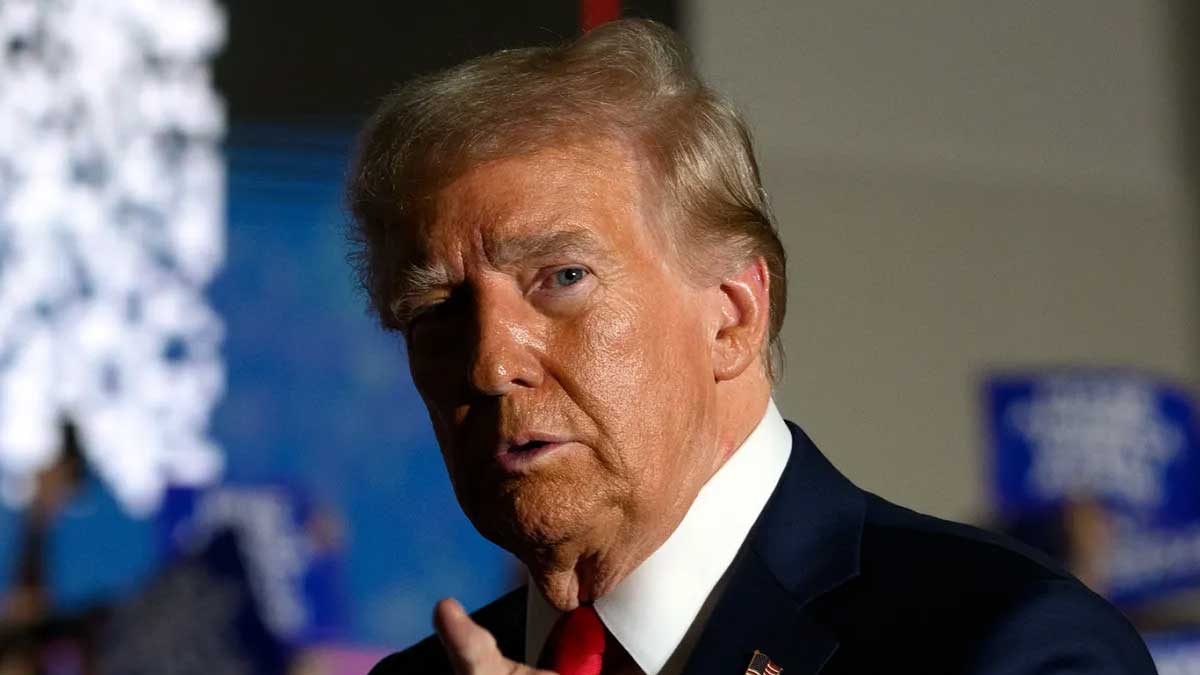- Home
- Billionaires
- Investing Newsletters
- 193CC 1000
- Article Layout 2
- Article Layout 3
- Article Layout 4
- Article Layout 5
- Article Layout 6
- Article Layout 7
- Article Layout 8
- Article Layout 9
- Article Layout 10
- Article Layout 11
- Article Layout 12
- Article Layout 13
- Article Layout 14
- Article Sidebar
- Post Format
- pages
- Archive Layouts
- Post Gallery
- Post Video Background
- Post Review
- Sponsored Post
- Leadership
- Business
- Money
- Small Business
- Innovation
- Shop
Recent Posts
Trump Claims ‘Election Interference’ Amid Legal Battles

Former President Donald Trump has reiterated his unfounded assertions that the ongoing federal election subversion case against him constitutes “election interference,” a sentiment he expressed following the unsealing of a new legal filing from Special Counsel Jack Smith on Wednesday. This move highlights a potential strategy for how Trump and his supporters might contest the results of the 2024 presidential election, should he lose to Vice President Kamala Harris.
In his remarks to NewsNation, Trump characterized the unsealing of Smith’s full criminal case as “election interference” and described it as the “weaponization of the government,” particularly critical of the timing just 30 days before the election. He has consistently claimed that prosecutors pursuing various criminal and civil cases against him are acting in concert with the Biden administration to undermine his electoral prospects.
Trump’s legal challenges encompass more than just his criminal case. He has frequently and inaccurately alleged that undocumented immigrants cast ballots in U.S. elections, leading to a series of lawsuits initiated by his allies. Some of these lawsuits, including those by the Trump-aligned America First Legal group in Arizona and Nevada, contest state voter registration practices, arguing that certain individuals registered without proof of citizenship—a requirement for state elections but not federal.
Moreover, the legal landscape is filled with nearly 90 lawsuits filed by Republican entities nationwide, laying the groundwork for potential disputes over election results. For instance, the Republican National Committee has initiated legal action in Montgomery County, Pennsylvania, claiming that election officials failed to meet deadlines for essential logic and accuracy tests on voting machines.
Absentee ballots have also come under scrutiny in key battleground states. In Michigan, the RNC argues that absentee ballots should be invalidated unless accompanied by a verification statement from election officials confirming the voter’s signature on the absentee ballot request form. Meanwhile, in North Carolina, the GOP is demanding that absentee ballots be discarded if they are not returned in a “container-return” sealed envelope.
Compounding these challenges, the Trump-aligned America First Policy Institute, alongside the Arizona Free Enterprise Club, is seeking to block a law aimed at preventing harassment of election officials and voters. They argue that the law’s vague language infringes on their First Amendment rights, with the case currently stalled in the courts.
In a controversial claim, Trump and his allies have described Vice President Harris’s late entry into the race as a “coup” and “unconstitutional,” asserting that her candidacy was illegitimate since it followed President Biden’s primary victories. Despite these claims attempting to sow doubt in the electoral process, election law experts maintain there is no legal basis for such assertions, as Biden’s delegates formally nominated Harris.
Trump has further alleged that the Harris campaign engaged in “illegal spying” following Justice Department charges against three Iranian hackers accused of stealing sensitive information from his campaign. However, the FBI has stated there is no evidence linking the Biden-Harris campaign to the hackers.
The recent unsealing of Smith’s filing disclosed critical details regarding Trump’s alleged attempts to overturn the 2020 election results. The filing states that Trump acknowledged his claims of widespread fraud lacked merit and that he intended to declare victory before the final vote count. It was revealed that Trump hired former New York City Mayor Rudy Giuliani to lead his legal team contesting the election results, reportedly because Giuliani was the only lawyer willing to assert false claims of victory.
Additionally, the court documents indicate that Trump displayed indifference when informed that former Vice President Mike Pence had to be evacuated to a secure location during the January 6 Capitol attack, responding with a dismissive “So what?” when alerted by an aide. Despite these allegations, Trump maintains his innocence and has pleaded not guilty to the charges.
In his response to the unsealing, Trump argued on Truth Social that the documents should not have been released prior to the election, alleging the Justice Department’s motives were to distract from the performance of Minnesota Governor Tim Walz in a recent vice presidential debate.
On the opposing side, Democrats and their aligned organizations have also initiated various election-related lawsuits challenging rules enacted in Republican-controlled states. They argue that these laws are overly restrictive and could hinder voter access while unnecessarily delaying the electoral process. For example, last month, the Georgia state and national Democratic parties sued the state over new rules that could permit county election officials to reject election results based on their “reasonable inquiry” into potential fraud.
Trump has professed that he would accept election results if they are fair, as he stated during a June CNN debate with President Biden. However, he simultaneously asserts on the campaign trail that Democrats can only win through cheating. In a recent radio interview, Trump even suggested that he would not run again in 2028 if he were to lose the upcoming election.
Looking ahead, some Republicans in Congress are echoing Trump’s sentiment that they will only accept election results if they are deemed fair, free of evidence of fraud or misconduct. The certification of electoral college results by Congress, typically a ceremonial process, was thrown into chaos following the 2020 election when Trump supporters stormed the Capitol in an attempt to obstruct the certification. House Speaker Mike Johnson, R-La., who helped formulate legal arguments for Republicans opposing the certification, stated that if elections are conducted fairly, they would adhere to the Constitution.
Historically, Trump’s attempts to contest the results of the 2020 election through various allegations of fraud and mismanagement have largely failed. A 2022 report titled “Lost, Not Stolen” by a group of conservative legal experts noted that of the 64 cases Trump and his allies filed across six battleground states, only one—filed in Pennsylvania—was successful. The majority of these lawsuits, which included allegations of improper ballot counting and voting machine malfunctions, were dismissed by judges across the political spectrum, including those appointed by Trump himself.
Recent Posts
Categories
- 193cc Digital Assets2
- 5G1
- Aerospace & Defense43
- AI32
- Arts3
- Banking & Insurance11
- Big Data3
- Billionaires211
- Boats & Planes1
- Business300
- Careers13
- Cars & Bikes66
- CEO Network1
- CFO Network17
- CHRO Network1
- CIO Network1
- Cloud10
- CMO Network18
- Commercial Real Estate7
- Consultant1
- Consumer Tech150
- CxO1
- Cybersecurity50
- Dining1
- Diversity, Equity & Inclusion4
- Education7
- Energy8
- Enterprise Tech29
- Events11
- Fintech1
- Food & Drink2
- Franchises1
- Freelance1
- Future Of Work2
- Games132
- GIG1
- Healthcare74
- Hollywood & Entertainment152
- Houses1
- Innovation37
- Investing2
- Investing Newsletters4
- Leadership65
- Lifestyle10
- Manufacturing1
- Markets20
- Media180
- Mobile phone1
- Money13
- Personal Finance2
- Policy537
- Real Estate1
- Research6
- Retail1
- Retirement1
- Small Business1
- SportsMoney21
- Style & Beauty1
- Success Income1
- Taxes2
- Travel10
- Uncategorized6
- Vices1
- Watches & Jewelry2
- world's billionaires181
Related Articles
Trump Secures 2024 Presidency After Key State Wins
Former President Donald Trump has won the 2024 presidential race, according to...
By 193cc Agency CouncilNovember 6, 2024Harris’ Path to Victory Narrows as Trump Wins Key States
In the latest developments of Election Day 2024, Vice President Kamala Harris...
By 193cc Agency CouncilNovember 6, 2024Abortion Ballot Results: Florida Rejects, Arizona Approves
In a significant series of votes on abortion rights across the U.S.,...
By 193cc Agency CouncilNovember 6, 2024Philadelphia Officials Reject Trump’s Voter Fraud Claims
Former President Donald Trump recently asserted that Philadelphia is plagued by “massive...
By 193cc Agency CouncilNovember 6, 2024















Leave a comment